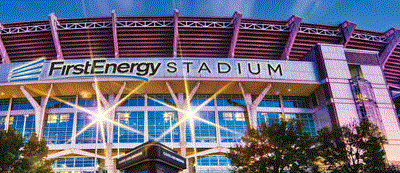FirstEnergy Corp. (NYSE: FE) is taking on a new risk, a risk which you will not find anywhere in its annual report and proxy filings. The company has partnered with the NFL’s Cleveland Browns to name what has been known as Cleveland Browns Stadium since 1999 the FirstEnergy Stadium.
FirstEnergy is an electric energy company with generation, transmission, and distribution activities. It has also been a corporate partner of the Browns since 1999. FirstEnergy was formed in 1997 when Ohio Edison merged with Centerior Energy Corporation, the parent company of The Cleveland Electric Illuminating Company and Toledo Edison.
So, back to the risk or curse. Many large companies have taken on stadium names and they have seen their shares get battered (or worse) after the move. It is not so much that shareholders find it a waste of money, but it is rather that the corporations behind such efforts often have risky businesses or they have squandered their assets. A few stadium name curses come immediately to mind, some of which were ended as the dot-com bubble burst:
- Enron Field in Houston, TX is now Minute Maid Park.
- MCI Center in Washington, DC is now Verizon Center.
- Adelphia Coliseum in Nashville, TN is now LP Field.
- CMGI Field in Foxboro, MA is now Gillette Stadium.
- PSINet Stadium in Baltimore, MD is now M&T Stadium.
- Trans World Dome (TWA-airline) in St, Louis. MO is now the Edward Jones Dome.
Terms of the naming-rights agreement in Cleveland were not disclosed and the deal is contingent upon approval from Cleveland City Council. After taking a look at the NFL and terms now, the stadium in Cleveland will become the 23rd of 31 NFL venues to have entered into a naming rights deal.
It makes perfect sense as to why the owners of a team or the creditors of a stadium would want to sell the naming rights to the stadium: FREE MONEY. Just keep in mind that the “free money” is coming from a group of shareholders and it has always been unclear as to what exactly the companies ultimately get by spending millions of dollars per year for this form of advertisement.
It’s Your Money, Your Future—Own It (sponsor)
Retirement can be daunting, but it doesn’t need to be.
Imagine having an expert in your corner to help you with your financial goals. Someone to help you determine if you’re ahead, behind, or right on track. With SmartAsset, that’s not just a dream—it’s reality. This free tool connects you with pre-screened financial advisors who work in your best interests. It’s quick, it’s easy, so take the leap today and start planning smarter!
Don’t waste another minute; get started right here and help your retirement dreams become a retirement reality.
Thank you for reading! Have some feedback for us?
Contact the 24/7 Wall St. editorial team.




